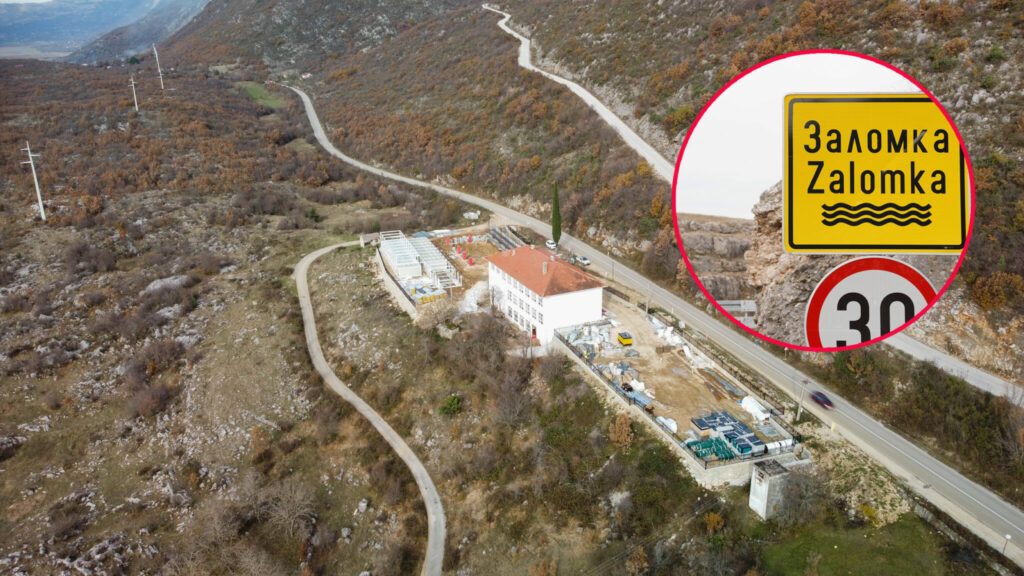The construction of HPP Dabar, as well as the entire project of Upper Horizons, will have immeasurable consequences not only on the entire Herzegovina area, and beyond, particularly the karst fields, the Neretva river basin, its delta, the wetland habitats, but also on the population of the Herzegovina region
The Center for environment from Banjaluka has filed a lawsuit with the District Court in Trebinje against the public enterprise Elektroprivreda RS due to the confidentiality of the contract on the construction of the hydropower plant (HPP) Dabar with the Chinese partners and the concealment of a loan agreement.
This is an epilogue of months-long tedium and the attitude of the government representatives and the institutions in RS towards the public and eco-activists and associations, namely towards the locals of Nevesinje region, who justifiably fear future accumulation and submersion of their private land.
RS Elektroprivreda and the Hydropower Plants on Trebišnjica (HET) have in the meantime submitted to the Ministry of Physical Planning, Construction and Ecology a request for an environmental impact assessment for the construction of HPP Bileća, thereby continuing the process of constructing hydropower plants in Herzegovina as part of the Upper Horizons project.
CHINESE WORKERS AT THE CONSTRUCTION SITE
And while waiting on the competent ministry to approve the environmental impact assessment concerning the construction of HPP Bileća, the construction of hydropower plant Dabar has been ongoing for half a year already – and very strongly. As previously said, this is the hydropower plant due to which the first lawsuits have been filed because the government representatives and the institutions in the RS are hiding both the contract with the Chinese and the loan agreement.
Let’s recall that realization of this project has started in 2016 and that it will cost around 338 million Euro. Representatives of the government in Republika Srpska, leadership of Elektroprivreda RS and the representatives of the Chinese company Gezuba group, as the contractor, had attended the cornerstone laying ceremony for the HPP Dabar in June of this year.
On the one hand, the ceremonial announcement of the investment and the project “which should transform Herzegovina” with the help of Chinese investors, and on the other fear and warnings of activists and some of the locals that the Upper Horizons project, which the Government, Elektroprivreda RS and Chinese companies co-drive, will irreversibly produce a negative impact on the environment and the lives of thousands of people in this part of Bosnia and Herzegovina.
Valter’s team met in Herzegovina with eco-activists and locals who are the most concerned about this. Truth be told, although there are also those who cannot wait to take some money for expropriation of the land that no one works anymore, fear and concern for the long-term future of Herzegovina villages and this region in general prevails.
We have also found some happy Chinese workers in Divin, where the roads to Berkovići and Nevesinje split. They are located in the old school on the highway, and are building a new facility next to the school for the purpose of constructing HPP Dabar.


The officials of Republika Srpska and Elektroprivreda have announced the completion of a project that is implemented in cooperation with a Chinese partner over the next four years. The contract was signed in May 2020 and the RS government gave a guarantee for 85 percent of the contract value.
As part of the HPP Dabar project, the company Integral inženjering is building a tunnel through which water from Zalomka River will be diverted to Bilećko Lake and further used for the needs of the HPP Dabar. However, doubts about the regularity of the entire project are justified, particularly since Hydropower plants on Trebišnjica (HET) do not want to publicly disclose the contract with the Chinese as well as the loan agreement.

The Center for environment from Banjaluka warns that there is no clear, official information about how far the accumulation of the new lake goes and what is being submerged. The public enterprise Hydropower plants on Trebišnjica (from the system of Elektroprivreda RS) did not want to answer our questions regarding the contract with the Chinese on the construction of HPP Dabar and the loan agreement, and were also deaf to our request to provide us with the documents. Elektroprivreda Republika Srpska did not respond to questions about the public availability of the contract with the Chinese partner.
We have sent questions to both of them in line with the provisions of the Law on Freedom of Access to Information.
Elektroprivreda RS has earlier negatively responded to the appeal of the Center for environment against the decision by which they rejected Center’s request for access to information regarding the contract with the Chinese partner.

HOW FAR WILL THE ACCUMULATION GO
What is known for now is that, among other things, parts of the village of Zovi Do in Herzegovina will be submerged. That's what the locals have said for Valter. There are also those, like Mihajlo Gutić, who are not dissatisfied with the fact that the HPP Dabar is being built in the immediate vicinity of the village and that water is diverted from Zalomka River for the needs of that hydropower plant, because they believe that their businesses will flourish (Mihajlo runs a small family restaurant in the village of Zovi Do).

However, majority of the locals do not see any benefit for the village and do not hide their dissatisfaction and fear.
The place where Integral inženjering is digging a tunnel for diversion of the water from Zalomka River is seen from Jovan Kovač's house. Even Jovan does not expect much benefit for the village from the project. Some people, he says, will take money for the land that is surplus to them, but in the long run this area has no chance.
“The village is already dying out, there are mostly older households and some people would like to sell the land and get rid of it because they have no one to leave it to. The youth left, the elderly households remained, and in my opinion, as long as this government is in power, it will not be completed. This is a good money factory, and nothing else”, said Jovan Kovač for Valter.

He testifies that the locals were told that the reservoir will evict some hamlets, but that there are definitely not more than 200 people in the village, whereof nine are elementary schools students. The future accumulation will submerge fifteen dunums of his land. It is still not his turn for the payment, and he does not even know what the price per square meter of the expropriated land will be.
“There is no perspective to revive the village, the village would revive on agriculture, and they are submerging the entire field. What will they live off? A village cannot live on water. Agriculture has fallen even now and that's why people here are looking to monetize the land because it's overgrown, there's no one to work it”, said Kovač not too optimistically.
We sent some of the questions that bother Kovač and other locals to the municipality of Nevesinje, but they didn't bother to answer them.
PROBLEMS FOR BUNA, BREGAVA, NERETVA…
Except for still waiting for documentation related to the construction of the HPP Dabar, the Center for environment in Banja Luka warns that the entire Upper Horizons project, which includes the construction of three hydropower plants, could have a disastrous impact on the environment, the lives of animals and people in this part of Bosnia and Herzegovina.
They stress that HPP Dabar is one of the most important links in the entire Upper Horizons project, but the HPP itself, as well as the entire project, will have immeasurable consequences on the eastern Herzegovina and beyond, especially the karst fields of eastern Herzegovina, the Neretva river basin, its delta, wetland habitats, but also on the population of the Herzegovina region.
“The hydropower plant Dabar, which has been under construction for years and has broken many deadlines, is the central power plant in the “Upper Horizons” system that consists of three power plants, three tunnels, two large dams and several concrete channels several kilometers long, which aim to transfer the water of Zalomka river towards Bilećko lake and further into Trebišnjica basin and the Adriatic Sea. The whole project is controversial and very harmful to nature for several reasons,” said Vladimir Topić from the Center for Environment for Valter.




He states that the main problem is the fact that a diversion of Zalomka river, which is a subterranean river, is planned for the construction of HPP Dabar. And the water that doesn't reach the Biograd abyss, he explains, doesn't even reach those rivers and river sources that it has been reaching for thousands of years through a complex system of underground streams, canals and caverns. Thus, by way of causality, the same problem can also be expected at the sources of the Buna, Bunica and Bregava rivers, because they could run out of that amount of water, and Neretva river would also run out the same amount of water, as shown by some analyses.
The Center for environment believes that one of the problems is the fact that the Upper Horizons project is an old Yugoslav project, and today the same 50-year-old data is being used, which is absurd, considering climate change. They also claim that the project threatens the destruction of karst fields such as Nevesinjsko, Dabarsko and Fatničko.
“Today, in contrast to the old project, irrigation systems are not planned, and fertile fields are submerged, and everything is done only for the production of electricity, which RS produces enough anyway”, said Vladimir Topić.
The towns in Herzegovina that are located along the rivers of the Neretva basin certainly do think about the impact that the cooperation between the authorities of Republika Srpska and the Chinese company Gezuba Group will have on Herzegovina.
Novi Val organization from Blagaj near Mostar appeals to all politicians to think before taking final action. They state that, if a reservoir is built in Nevesinjsko field and if underground canals are concreted, there will be a huge problem for the whole Herzegovina, because food production, as well as people’s lives, will be jeopardized.
“First of all, the public in Herzegovina is not aware of potential problems. I think that investors always say that everything is wonderful, but what if it happens that, as the information from old surveys show, the Bregava River and the Bunica River completely dry out in the summer? Buna has three branches of water supply, so it is a little less endangered. Over the past ten years it has become clear that the water levels have greatly decreased and that we have less and less rain, which is reflected in the amount of water in Neretva river as well. The question arises if that part of the water is diverted through the Upper Horizons project, and the assumption is that a third of the water will be diverted to other streams, what then”, warns Adnan Đuliman from the organization Novi Val from Blagaj.

Đuliman testifies that the residents of Metković, Čapljina and some other places are already finding salt water in the wells that mixes with fresh drinking water, which is a consequence of the reduced inflow of fresh water. This is already a problem even without the construction of the Upper Horizons system.
“Politicians do not pay attention to all this yet. We think it is very important that the representatives of Čapljina, Blagaj, Mostar hold a meeting with the investors and see how to proceed. Chinese companies and the government of Republika Srpska, which approved everything, must take care of the entire project. We know that many conventions prohibit the diversion of water courses and the battle for Herzegovina will not stop here,” promises Đuliman.
As usual, even the Ministry of Energy and Mining in the RS Government did not respond to our questions regarding the construction of HPP Dabar.
The key question left unanswered is why the contract on the construction of the hydropower plant with the Chinese partner was not publicly disclosed, that is, what is being hidden?
It is worth reminding that, when it comes to projects and agreements signed with Chinese companies, the Government of Republika Srpska regularly refuses to make these contracts available to the public for inspection, which in addition to lack of transparency also points to corrupt practices. The most obvious example is the contract on the construction of the Banjaluka-Prijedor motorway, which, despite two judgments of the Banja Luka District Court, has not yet been published by the Ministry of Transport.








